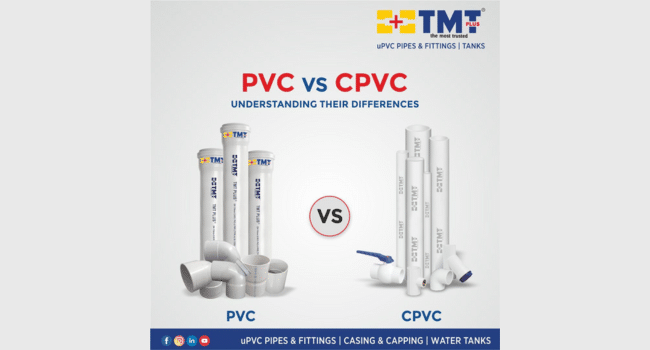Table of Contents
Crucial point is the temperature
To determine whether PVC or CPVC pipe is the right choice, consider the specific characteristics of each material. The following questions are essential: Are the pipes exposed to heat, and do they need adequate heat protection? How crucial is the material cost? Where and what size are the pipes to be installed? If we’re talking about drainage and plumbing needs, then who is the best SWR pipe manufacturer in India?
The answers to these questions guide your material choice. For instance, cPVC is a safer option for heat-exposed pipes due to its higher heat resistance. In this article, we will list applications of CPVC and PVC pipes to guide you on which is best to use in specific areas.
CPVC Pipes
CPVC (Chlorinated Polyvinyl Chloride) pipes are a type of thermoplastic piping material. They are similar in appearance to PVC pipes but are specifically engineered to handle hot and cold water, making them suitable for both potable water supply and industrial applications. CPVC pipes are known for their high-temperature resistance, corrosion resistance and ease of installation. They are commonly used in residential and commercial plumbing systems, including water distribution and fire sprinkler systems.
PVC Pipes
PVC (Polyvinyl Chloride) pipes are a type of plastic piping that is used in construction and plumbing. They are known for their durability, affordability, and resistance to corrosion, making them ideal for water supply, drainage, and sewage systems. PVC pipes are lightweight, easy to install, and come in various sizes and configurations. Getting pipes for use in our spaces from the best uPVC pipe suppliers in India, like TMT Plus, not only assures us of its quality but also guarantees its longevity.
Differences between PVC pipes and CPVC pipes:
- Chlorination: PVC pipes are made from regular PVC resin, while cPVC pipes are created by chlorinating PVC resin. The process of chlorination gives cPVC its enhanced heat and chemical resistance.
- Temperature Resistance: PVC pipes are suitable for cold water applications and have a maximum operating temperature of around 60°C. In contrast, cPVC pipes are designed for both hot and cold water systems, with a maximum operating temperature of approximately 93°C.
- Chemical Resistance: cPVC offers better chemical resistance compared to PVC, making it more suitable for industrial and chemical applications where corrosive substances are present.
- Economics of the Two Pipes: PVC pipes are generally more affordable than cPVC pipes. If the application does not require high-temperature or chemical resistance, PVC may be a cost-effective choice.
- Color: cPVC pipes are typically off-white or cream-coloured, while PVC pipes are white or gray. This color difference can help with easy visual identification.
- Installation Method: The installation methods for both PVC and cPVC are quite similar, as they use solvent cement or glue for joining. However, cPVC requires a different type of cement specifically designed for cPVC joints.
- Regulatory Approval: cPVC is often required for compliance with building codes in situations where higher temperature resistance is needed, such as in hot water supply lines or fire sprinkler systems.
Applications of PVC and CPVC Pipes
PVC pipes are commonly used for drainage, venting and low-temperature applications, while CPVC is more suitable for hot and cold potable water systems, industrial piping, and applications involving higher temperatures and aggressive chemicals.
When choosing between PVC and CPVC pipes, consider the specific requirements of your project, including temperature requirements, budget and the presence of chemicals or corrosive materials. Making the right choice ensures a safe and efficient plumbing or piping system.
Why You Should Choose PVC Pipes by Leading Brands
PVC pipes by the leading brands stand out as a top-notch choice for plumbing and drainage systems, as they are the best uPVC pipe for water supply. Their ease of installation and low maintenance requirements not only save time and labor costs but also ensure a reliable and long-lasting solution. TMT Pus offers high-quality PVC pipes that are backed by a robust warranty, providing customers with confidence in their choice.
These pipes are not only durable and leak-resistant but also uphold high hygienic standards, which are crucial for drinking water systems. By opting for the best PVC pipes, individuals make a prudent choice that balances basic and desirable features with responsibility towards the environment, thereby contributing to a more sustainable and efficient construction industry in India.
Read more on KulFiy
Basic things to know about Stainless Steel Pipes
